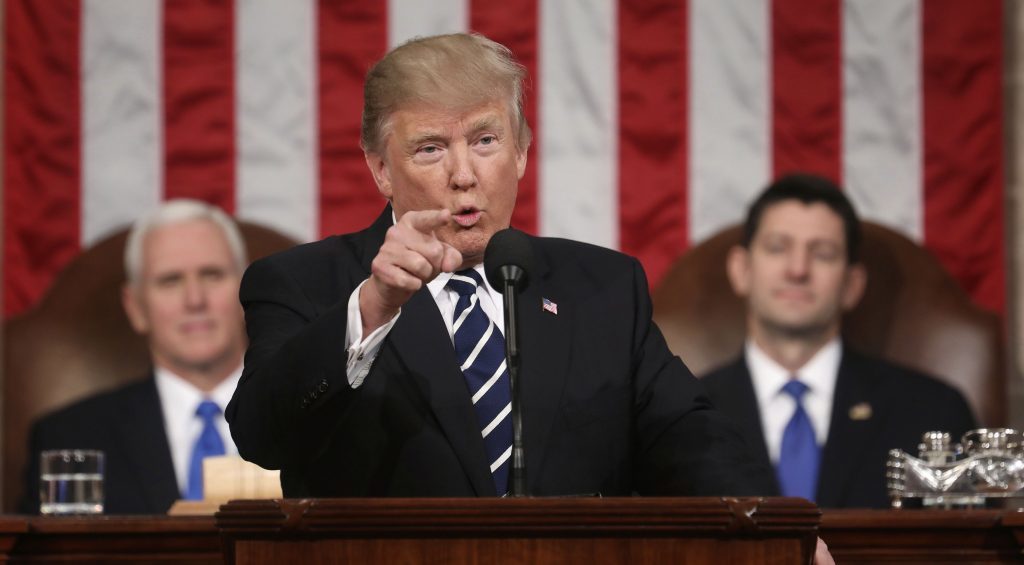
The Government will “certainly” stand up to US President Donald Trump over his administration’s sanctions on Iran, the minister of state for the Middle East has said.
Alistair Burt said the Iran nuclear deal was an important part of “not only the region’s security but the world’s security”.
But President Trump issued a warning for countries trading with Iran, tweeting: “Anyone doing business with Iran will NOT be doing business with the United States. I am asking for WORLD PEACE, nothing less!”
Mr Burt’s comments came as the UK and EU announced they will take immediate action to block the impact of US sanctions, which came into force on Monday after President Trump backed out of the 2015 Iran nuclear deal in May.
Foreign Secretary Jeremy Hunt issued a joint statement with EU foreign ministers on their “determination to protect” European businesses working with Iranian companies.
Asked if Britain would go along with the US and impose sanctions as well, Mr Burt told BBC Radio 4’s Today programme: “No, we made it clear when the US announced its proposed position a little while ago that we regard the JCPOA (Joint Comprehensive Plan of Action), the nuclear deal as an important part of not only the region’s security but the world’s security.
“Iran has been complying with this nuclear deal in terms of removing part of its uranium stock and complying with the determination of the IAEA (International Atomic Energy Agency) to make sure that it wasn’t returning to nuclear adventurism, we think this is really important.
“There are other things that involve Iran that we’re concerned about in the region, but sticking to a deal which a number of partners had agreed to we thought was important.”
Mr Burt acknowledged the US move was a “powerful threat”, but added: “It’s a commercial decision for companies whether or not they continue to work in Iran, we believe that they should as part of JCPOA.”
He said that “getting Iran to alter behaviour in the region remains excessively important”, adding that “removing the agreement and allowing Iran in effect to return to the very thing that caused the agreement to be made in the first place, the fear of Iran moving to a nuclear position, that doesn’t seem to us to be worthwhile”.
Asked if the Government would stand up to the US, he went on: “As far as a disagreement with President Trump on this is concerned, they can certainly expect the UK to do this.
“People talk about a partnership between us which is very real but a good partnership between friends requires us to take a stance when we think it’s important to do so.”
Underlining the importance of the deal, he added: “One partner pulling out of this doesn’t help that situation at all, that’s why we think the Americans really have not got this right but we hope a combination of what they are doing and what the rest of us are doing will move Iran in a different direction.”
The joint statement said: “The lifting of nuclear-related sanctions is an essential part of the deal – it aims at having a positive impact not only on trade and economic relations with Iran, but most importantly on the lives of the Iranian people.
“We are determined to protect European economic operators engaged in legitimate business with Iran, in accordance with EU law and with UN Security Council Resolution 2231.
“This is why the European Union’s updated Blocking Statute enters into force on 7 August to protect EU companies doing legitimate business with Iran from the impact of US extra-territorial sanctions.”
Ambassador John Limbert, one of the American embassy officials in Tehran who was held captive in 1979 and went on to help negotiate the 2015 deal under former US president Barack Obama, said the US administration was interested in a “surrender” from Iran.
Asked if the nuclear deal was dead, he told Today: “It depends on how much the Trump administration can bully the Europeans to go along with sanctions and to go along with pulling out of at least part of the deal.”
Mohammad Marandi, a professor at the University of Tehran, told Today: “It’s a war, the US is engaging in war, but it’s directed at ordinary Iranians, the hope by the Americans is to make life so miserable for Iranians that they will force the government to capitulate to the US, that is what the Americans are seeking.”
Recommended for you
